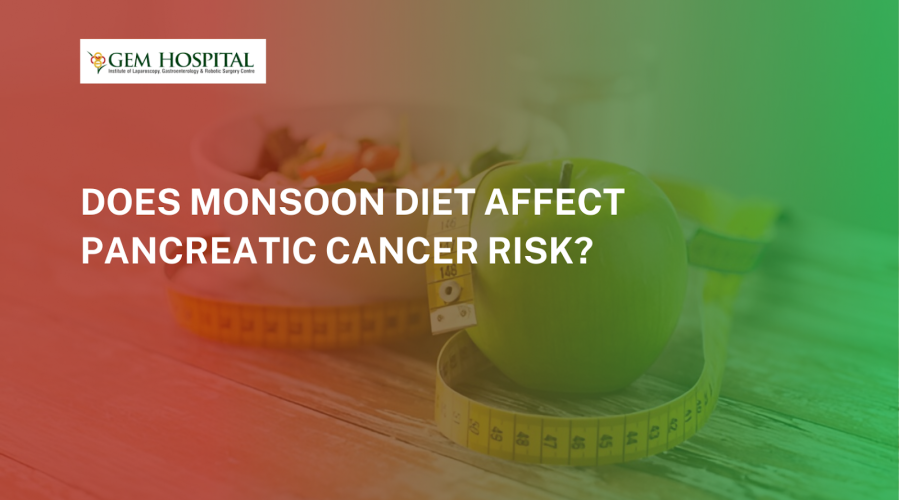Consult experienced hernia doctors in Chennai for expert surgical care. Advanced diagnosis, safe hernia surgery, and faster recovery with specialized treatment.
Does Monsoon Diet Affect Pancreatic Cancer Risk?

While the monsoon season may bring some much-needed relief to weather-stricken people, it also leads to a rise in infections, digestive upset, and immunity issues. What people don't realize is that seasonal changes, and especially food choices in the rainy season, can affect the function of internal organs like the pancreas. Recent research has indicated that certain food patterns during this time may impact the risk for pancreatic illness and even pancreatic cancer in an indirect way. Understanding the link between the monsoon diet and pancreatic cancer risk empowers you to make intentional food choices that will benefit your digestion and long-term health.
How the Monsoon Affects Digestion and Pancreatic Health
When the rainy season arrives and humidity levels are higher, sunlight levels drop. In this situation, our metabolism drops, our immune functions shift, and even the digestion of heavy or oily foods changes. The pancreas produces enzymes to digest fat and proteins and is likely most impacted by dietary changes. When you eat too many fried, spicy, or processed foods (which people tend to crave more in the monsoon), the pancreas is forced to work harder ultimately leading to enzyme imbalance or inflammation.
Although this doesn’t immediately damage the pancreas, longer-term strain can lead to chronic inflammation, a risk factor for pancreatic cancer. And, the more humid the climate, the more bacteria and fungi can grow in our food resulting in bowel infections that impair pancreatic function.
Another more subtle lifestyle issue might be through blood sugar control, as the pancreas regulates insulin as well.Comfort foods often consumed during the rainy season (sweet foods, fried foods, packaged food, etc) are notorious for the extreme spikes they incur in blood glucose levels and placing undue stress on the pancreatic cells (beta cells), which over time, increases the risk for diabetes (which is also a risk factor for developing pancreatic cancer!).
- Fried and oily foods: Bhajis, Samosas, Pakoras, etc. are staples on rainy days but they also contain trans fats which further the inflammation and oxidative damage to the tissues in the pancreas.
- Snack foods: Instant noodles, chips, pastries and sugary drinks overload the pancreas with simple carbohydrates.
- Spoilage: The moisture content of the environment will spoil food faster creating bacterial toxins that may negatively affect the digestive organ.
- Alcohol and smoking: Each rainy season when the rain falls and cozy feelings arrive are also additional temptations to be drinking, drinking is known to cause severe damage to pancreatic cells and can even cause chronic pancreatitis leading to pancreatic cancer.
Full fat food products: The excess highly saturated fat product will contribute to increased stress on pancreatic production of digestive enzymes.
Having as clean a diet as possible and made freshly is important; for example it is important not to overheat food and reheat it multiple times once it has been cooked and good sanitation of all vegetables and fruits are very important as well.
Monsoon Diet for Better Pancreatic Health
An organized diet can reduce inflammation, enhance immunity, and thus offer indirect protection against pancreatic cancer. The following foods should be part of your diet -
1. Antioxidant-rich foods: Berries, oranges, and guavas are rich in Vitamin C. Vitamin C helps neutralize free radicals and lowers oxidative stress that causes cancer in cells.
2. Leafy greens: Spinach, kale, and moringa contain chlorophyll and many plant compounds aiding detoxification and balancing pancreatic enzymes.
3. Whole grains and fiber: Include oats, brown rice, and millets in your diet. They improve digestion and insulin regulation, reducing stress on the pancreas.
4. Turmeric and ginger: Both are natural, effective anti-inflammatories. A pinch of turmeric stirred into a glass of warm water or food may help protect pancreatic cells.
5. Lean proteins: Include fish, lentils, and tofu, instead of heavy meats, to reduce the amount of fat in your diet while absorbing protein.
6. Hydration and herbal teas: Green tea, cumin-water, or lemon-infused water support digestion and detoxification during humid weather.
Additionally, smaller, more frequent portions of food, instead of larger amounts of food, will help your pancreas perform efficiently without ever going into overload.
Lifestyle Habits that Maintain a Healthy Monsoon Diet
In addition to food, your regular daily habits are often just as critical to pancreatic health.
1. Do not skip meals. Long gaps between meals lead to possible imbalance in enzymes and acid buildup.
2. Even on rainy days stay active indoors. Light exercise helps improve metabolism and insulin sensitivity.
3. Reduce your stress. Chronic stress affects hormone balance and production of digestive enzymes - with indirect effects on the pancreas.
4. Get regular health screenings. If you have a family history of diabetes, obesity, or pancreatic disorders consider preventive check-up screening once or twice a year.
All of these small steps can help decrease inflammation, stabilize digestion, and become a strengthening of your body's natural protection mechanism from malignant disease.
Nutrition and the Science of Preventing Pancreatic Cancer
Research supports that high antioxidants, high fiber, and balanced diet high in healthy fats reduce inflammation and help to prevent DNA damage in pancreatic cells. The protective effect of proper diet is mostly seen from the role of polyphenols (green tea, fruits, and turmeric) and omega-3 fatty acids (fish and flaxseeds) acting together, against the triggering of tumor-promoting pathways. On the other side of the spectrum, processed diet high in fats and sugars produce a sequence of increasing insulin resistance and inflammation resulting in a cancer friendly environment.
Therefore, while the link between monsoon diet and pancreatic cancer risk is not direct, there are many factors involved such as digestion, immunity, and metabolism to consider to understand the link. The key component is recognizing that making better clean food options, avoiding contaminated or processed food during this time, is significant to improving resilience of the pancreas health and to the overall health of your body in general.
The foods during the monsoon season either offer protection, or harm the pancreas. When balanced together, diets with a focus on antioxidants, hydration, and moderation of fat can help to bolster your immunity while lowering risk over the long-term.
At GEM Hospital the strong belief in the positive impact of nutrition and lifestyle habits can prevent gastrointestinal diseases, and pancreatic disease. Our specialists provide expert consultations, advanced diagnostic services, and personalized dietary evaluation to optimize your gastrointestinal health.
Be proactive about your healthier life. The first way to protect your pancreas is by excessive food evaluations in all we consume. Book your appointment today with GEM Hospital, and protect your pancreas this monsoon.
Blogs & Article
Get advanced liver transplant treatment in Chennai with expert surgeons, modern technology, and comprehensive care for safe and successful outcomes.
Get advanced piles treatment in Erode with expert doctors. Safe procedures, modern technology, and effective care for fast relief and recovery.


